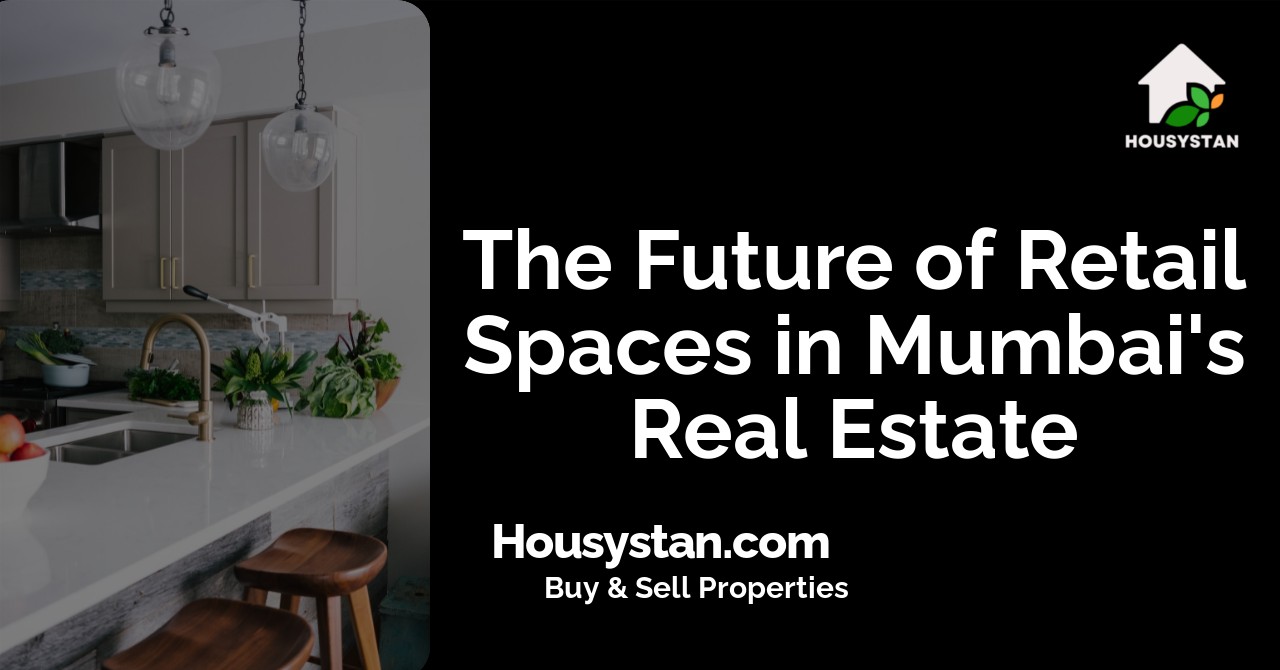The Future of Retail Spaces in Mumbai's Real Estate
Read latest blogs and articles from Housystan

The Information mentioned here was last updated on:
18/2/2026The Future of Retail Spaces in Mumbai's Real Estate
Understanding Mumbai’s Retail Revolution
Mumbai, India’s vibrant financial capital, is experiencing a significant transformation in its retail real estate sector. From traditional markets to cutting-edge shopping centers, the city’s retail spaces have continuously adapted to evolving consumer demands, technological advancements, and the dynamic nature of urban lifestyles. The future of retail spaces in Mumbai promises innovation, resilience, and a blend of global trends with local flavor, offering immense opportunities for investors, developers, and shoppers alike.
- Verified Tenants/Buyers
- Unlimited Property Listing
- Zero subscription/charges fee
The Current Landscape: Where Tradition Meets Innovation
Mumbai’s retail ecosystem has always thrived on diversity. From bustling street markets in Colaba and Dadar to luxury malls in Lower Parel and Bandra, the city offers a spectrum of retail experiences. However, the last decade has witnessed a clear shift towards modern, organized retail formats. Developers are focusing on mixed-use developments, integrating retail with residential, office, and entertainment spaces for a holistic urban experience.
Key Drivers Shaping Mumbai’s Retail Real Estate
Several factors are influencing the future trajectory of retail spaces in Mumbai. Among the most notable are:
1. Digital Transformation
The rise of e-commerce has compelled physical retailers to rethink their strategies. Many malls and high streets are leveraging digital tools, interactive technology, and omnichannel models to enhance customer engagement. Click-and-collect, virtual fitting rooms, contactless payments, and personalized promotions are becoming mainstream, creating seamless integration between online and offline shopping experiences.
2. Changing Consumer Preferences
Today’s Mumbai shoppers seek more than just products; they crave immersive experiences. Retail spaces are evolving into lifestyle destinations, offering a mix of shopping, dining, entertainment, and wellness. The emergence of pop-up stores, concept boutiques, and experiential zones reflects this shift, attracting a younger, aspirational demographic.
3. Sustainability and Green Practices
With growing environmental consciousness, sustainable design and eco-friendly operations are gaining prominence. Developers are incorporating energy-efficient lighting, rainwater harvesting, waste management systems, and green building certifications into retail projects. Such initiatives not only benefit the environment but also appeal to socially responsible consumers and global brands.
4. Strategic Locations and Infrastructure
Retail hotspots are emerging along metro corridors, business districts, and upcoming residential hubs. Proximity to transport nodes, improved road connectivity, and urban redevelopment projects are driving footfalls and enhancing the commercial viability of retail spaces. Locations such as BKC, Andheri, Thane, and Navi Mumbai are witnessing increased interest from both national and international retailers.
Flexible Formats and Mixed-Use Developments
Flexibility is the new mantra in Mumbai’s retail real estate. Gone are the days of rigid, single-use malls. Developers are experimenting with formats such as open-air markets, high-street retail, food courts, entertainment hubs, and co-retailing spaces. Mixed-use developments, combining retail with offices, hotels, and residences, are becoming increasingly popular. This integrated approach maximizes land use, creates steady footfall, and ensures long-term sustainability.
Technology: The Game Changer
Technology is playing a pivotal role in redefining the retail experience. Smart malls in Mumbai are investing in advanced security systems, digital directories, Wi-Fi connectivity, and mobile apps for easy navigation and promotions. Data analytics help retailers understand customer behavior, optimize inventory, and personalize marketing efforts. Augmented reality (AR) and virtual reality (VR) are being used to create engaging product displays and immersive experiences, blurring the lines between physical and digital retail.
Challenges on the Horizon
Despite the positive outlook, Mumbai’s retail real estate sector faces certain challenges. High real estate costs, regulatory hurdles, and infrastructure limitations remain persistent issues. The pandemic has also accelerated shifts in consumer behavior, with many shoppers turning to online platforms for convenience and safety. Retailers and developers need to stay agile, adapting to new trends and potential disruptions in the market.
The Role of Government Policies
The Maharashtra government’s proactive policies, such as the ease of doing business, single-window clearances, and incentives for green buildings, are providing much-needed support to the retail sector. Initiatives like the Mumbai Metro expansion, redevelopment of old precincts, and urban renewal projects are creating new opportunities for retail growth. Public-private partnerships and foreign investments are further boosting confidence among stakeholders.
Emerging Trends to Watch
Several new trends are shaping the future of Mumbai’s retail spaces:
1. Retailtainment: The fusion of retail and entertainment is creating unique destinations that attract families and millennials alike. From gaming zones and multiplexes to art galleries and themed cafes, malls are offering diverse attractions beyond shopping.
2. Focus on Local Brands: While international brands remain popular, there’s a growing appreciation for homegrown labels, artisanal products, and regional cuisines. This hyperlocal approach resonates with Mumbai’s cosmopolitan yet rooted culture.
3. Health and Wellness: Wellness centers, organic food outlets, and fitness studios are becoming integral to retail developments, catering to the city’s health-conscious population.
4. Adaptive Reuse: Many older commercial buildings are being repurposed as boutique retail hubs, co-working spaces, or art districts, preserving Mumbai’s architectural heritage while meeting modern demands.
Investment Opportunities and Outlook
Mumbai’s retail real estate continues to be a lucrative avenue for domestic and international investors. The city’s robust economic fundamentals, young workforce, and high purchasing power drive sustained demand for quality retail spaces. With the right mix of innovation, strategic planning, and customer-centric design, the future of retail in Mumbai looks promising. Developers who embrace flexibility, technology, and sustainability will reap long-term rewards.
Conclusion: Embracing the Future of Retail in Mumbai
The evolution of Mumbai’s retail spaces reflects the city’s spirit—dynamic, diverse, and forward-looking. As consumer expectations rise and technology continues to advance, retail environments will become more interactive, sustainable, and customer-focused. For those invested in Mumbai’s real estate story, staying ahead of trends, understanding local nuances, and fostering collaboration between all stakeholders will be key to unlocking the city’s retail potential in the years to come.